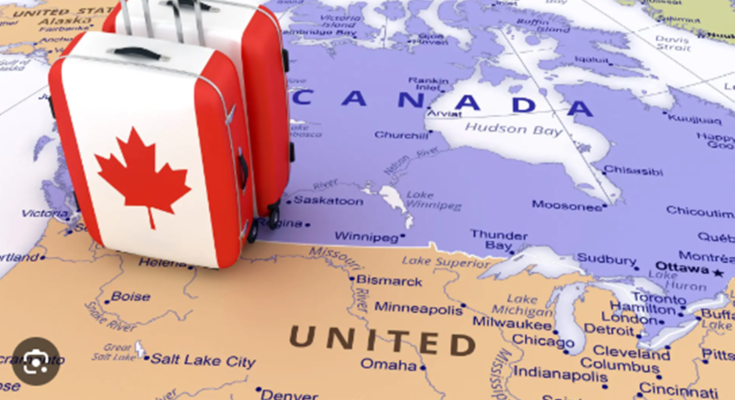Canada Tourist Visa Requirements: Navigating visa requirements is crucial for anyone planning to visit Canada, especially immigrants aiming for a tourist visa.
This guide focuses on providing essential insights for immigrants looking to explore Canada’s rich cultural and natural heritage as tourists.
Understanding the Canada Tourist Visa
A Canada tourist visa, formally known as a Temporary Resident Visa (TRV), is an official document issued by the Canadian government that allows individuals to visit Canada for a short period, typically up to six months. This visa is essential for travelers who wish to explore Canada’s vast landscapes, participate in tourism activities, visit family or friends, or engage in short-term business visits. It is affixed to the visitor’s passport to indicate that they have met the requirements for admission to Canada as a temporary resident.
Purposes of a Canada Tourist Visa:
- Tourism and Sightseeing: Travelers can explore Canada’s natural wonders, cities, and cultural attractions.
- Visiting Relatives or Friends: Allows individuals to spend time with loved ones residing in Canada.
- Business Visits: Enables business professionals to attend meetings, conferences, or short-term business engagements without entering the Canadian labor market.
- Participation in Short-term Events: Visitors can attend events like festivals, shows, and courses lasting less than six months.
Distinction Between Tourist Visas for Immigrants and Non-immigrants:
- Tourist Visa for Non-immigrants: This is the standard Temporary Resident Visa (TRV) for tourists who intend to stay in Canada temporarily and have no plans to immigrate. Applicants must prove their intent to return to their home country after their visit.
- Tourist Visa for Immigrants: Generally, immigrants do not require a tourist visa, as they are granted permanent resident status or other long-term visas that allow for extended stays or settlement in Canada. In scenarios where potential immigrants explore Canada before committing to immigrate, they would still apply for a Temporary Resident Visa, underpinning their non-immigrant status at the point of entry.
However, understanding these distinctions and the purpose of a Canada tourist visa can help streamline the application process and ensure a successful visit to Canada.
Eligibility Criteria for Canada Tourist Visa for Immigrants
Understanding the eligibility criteria is crucial to ensure a successful application. This guide outlines the general requirements and specific conditions that might uniquely affect immigrants.
General Eligibility Requirements for a Canada Tourist Visa
- Valid Passport: Applicants must possess a valid passport with an expiry date that extends beyond the duration of their planned stay in Canada.
- Good Health: Applicants should be in good health, and depending on the applicant’s home country, a medical examination may be required.
- No Criminal Record: Applicants must not have any criminal history or immigration-related convictions. A background check is typically conducted.
- Financial Proof: Proof of sufficient funds to cover the stay in Canada is necessary. This includes bank statements or a financial support letter from someone who will support the applicant during their stay.
- Purpose of Visit: Applicants must provide a clear itinerary or explanation of their travel plans and prove that their primary intent is tourism.
- Ties to Home Country: Evidence of strong ties to the applicant’s home country, such as employment, a house, family, or financial commitments, that will ensure their return after the visit.
- Invitation Letter: If visiting family or friends, an invitation letter may be required to support the application.
Specific Conditions Affecting Immigrants
- Visa History: Immigrants who have previously been refused visas to Canada or any other country may need to provide additional documentation or explanations.
- Country of Origin: Applicants from countries with higher rates of visa rejection may face stricter scrutiny and require more substantial proof of their temporary intent in Canada.
- Residency Status: The current legal residency status of the applicant in their home country or country of residence can influence the visa decision.
- Previous Overstays: Immigrants who have overstayed their permitted time in Canada or other countries might find it more challenging to obtain a tourist visa.
- Dual Intent: While a tourist visa is specifically for tourism, applicants who may be perceived as intending to use the visa to remain in Canada (dual intent) could face additional examination.
It’s recommended for applicants to consult the latest information from the official Government of Canada website or seek guidance from immigration professionals to address any concerns specific to their circumstances and ensure compliance with the current visa policies and regulations.
Required Documents for Canada Tourist Visa Application
To ensure a smooth application process, it’s important to gather all the required documents beforehand. Below, we provide a detailed guide to help you prepare your application effectively.
Essential Documents Needed for the Visa Application
- Passport: Your passport should be valid for at least six months beyond the date of your intended departure from Canada.
- Application Form: The completed visitor visa (temporary resident visa) application form.
- Photographs: Two recent passport-size photographs that meet the visa requirements.
- Proof of Financial Means: Evidence of sufficient funds to cover your stay in Canada. This could include bank statements, payslips, or proof of investments.
- Travel Itinerary: A detailed itinerary of your trip including proof of accommodation and return ticket.
- Invitation Letter: If you are visiting family or friends, a letter of invitation from your host in Canada.
- Employment Verification: A letter from your employer stating your job position, salary, and the details of your leave.
- Fee Payment: Proof of payment for the visa processing fee.
Additional Documents That Might Be Required
- For Students: Proof of enrollment if you are visiting Canada during a school break.
- For Business Visitors: Documents related to your business interests in Canada, such as conference registrations or business invitations.
- For Parents or Grandparents: A copy of the birth certificate of the child or grandchild you will be visiting, along with documents proving their status in Canada.
- For Extended Stays: Additional documents may be required to justify a longer visit.
- Country-Specific Requirements: Depending on your country of origin, additional documents such as medical exams or police certificates might be needed.
However, always check the latest requirements from the Canadian embassy or consulate before applying, as document requirements may vary slightly depending on your specific circumstances.
Step-by-Step Application Process for Canada Tourist Visa
Applying for a Canada tourist visa as an immigrant requires careful attention to detail and thorough preparation. Here’s a comprehensive guide to help you navigate the process smoothly and efficiently.
1. Determine the Type of Visa You Need
Firstly, confirm that the tourist visa (Temporary Resident Visa) is appropriate for your travel needs. Visit the official Immigration, Refugees and Citizenship Canada (IRCC) website for guidance on the types of visas available.
2. Gather Required Documents
Collect all necessary documents, including your passport, travel itinerary, financial proofs (like bank statements), employment details, and a letter of invitation from someone in Canada, if applicable.
3. Complete the Application Form
Download and fill out the application form from the IRCC website. Ensure you answer every question accurately to avoid delays in processing.
4. Pay the Application Fee
The application fee for a Canada tourist visa must be paid online through the IRCC portal. Keep a copy of the receipt as proof of payment.
5. Submit the Application
You can submit your application either online or at a Visa Application Centre (VAC). Ensure all documents are complete and correctly submitted.
6. Attend the Interview, If Required
Some applicants may be required to attend an interview at their local VAC or consulate. Be prepared to discuss your travel plans and ties to your home country.
7. Provide Biometrics
Most applicants will need to provide biometrics (fingerprints and a photograph). Check the IRCC website to see if this requirement applies to you.
8. Wait for Processing
Processing times can vary, so be patient. You can check the status of your application online through the IRCC website.
9. Receive Your Visa
Once approved, you’ll receive a visa sticker in your passport indicating the validity of your visa and the duration of your allowed stay in Canada.
Tips on Filling Out the Application Form and Common Mistakes to Avoid
- Double-Check All Information: Before submitting, verify all the details in your application form to ensure they are correct and match the information in your supporting documents.
- Complete All Sections: Incomplete applications are a common reason for delays. Fill out every section, and write ‘N/A’ if a section does not apply to you.
- Provide Accurate Contact Information: Ensure your email and mailing addresses are current and correctly entered to avoid miscommunications.
- Avoid Common Errors: Common mistakes include incorrect visa type selection, outdated information, and missing signatures. Review your application multiple times to catch any errors.
- Follow the Instructions: Adhere strictly to the guidelines provided by IRCC regarding document formats, sizes, and other application details.
By following these steps and tips, you can enhance your chances of a successful Canada tourist visa application, ensuring a smooth and pleasant travel experience.
Processing Times and Fees for Canada Tourist Visa
Processing Times
The processing time for a Canadian tourist visa, also known as a Temporary Resident Visa (TRV), varies depending on several factors including the applicant’s country of residence, the volume of applications, and the specific visa office handling the application. Generally, processing times can range from a few days to several weeks. As of the latest updates, the average processing time is approximately two weeks, but applicants are advised to apply at least 12 weeks before their intended travel date to accommodate any unexpected delays.
Visa Application Fees
The fee for a Canadian tourist visa is CAD $100 per person. In addition to the visa application fee, there is a biometrics fee of CAD $85 for individuals or CAD $170 for families applying together. These fees are mandatory and non-refundable, regardless of the outcome of the application.
Methods of Payment
Payments for the Canadian tourist visa and the biometrics fee can be made online through the Immigration, Refugees and Citizenship Canada (IRCC) website. Accepted methods of payment include credit cards (Visa, MasterCard, American Express) and prepaid cards. Payments can also be made directly at Visa Application Centers (VACs) if submitting in person, where debit cards and cash may also be accepted.
However, applicants should ensure they have the latest information by checking the official Canadian immigration website or contacting their nearest visa application center, as fees and processing times are subject to change.
Interview Process for Canada Tourist Visa
If you are applying for a Canada Tourist Visa, an interview may be part of the application process. The purpose of the interview is to verify the information provided in your application and to ensure that your visit is for tourism purposes. The need for an interview largely depends on your specific circumstances, including your nationality, the completeness of your application, and your travel history.
Sample Questions for the Canada Tourist Visa Interview
During the interview, you can expect questions aimed at confirming the details of your visit and assessing your intentions. Here are some sample questions you might be asked:
- What is the purpose of your visit to Canada?
- How long do you intend to stay in Canada?
- Where will you be staying during your visit?
- Do you have family or friends in Canada?
- What is your occupation, and who is your employer?
- How do you plan to fund your stay in Canada?
- Have you visited Canada before?
- What are your travel plans within Canada?
Tips on Preparing for the Interview
To increase your chances of a successful interview, consider the following tips:
- Be Well-Prepared: Gather all necessary documents, including your passport, proof of financial means, itinerary, and any invitation letters. Make sure these documents are organized and easy to present.
- Practice Your Answers: Familiarize yourself with common interview questions and practice your responses. This will help you appear more confident and articulate during the interview.
- Be Honest and Consistent: Provide truthful answers that are consistent with what you have stated in your visa application. Any discrepancies could raise concerns about the credibility of your application.
- Understand Your Itinerary: Be clear about your travel plans and be able to discuss them in detail, as this demonstrates genuine tourism intent.
- Dress Appropriately: Dressing professionally can help make a good impression and show that you take the interview seriously.
By preparing effectively, you can approach your interview with confidence, increasing the likelihood of a positive outcome.
Extending Your Stay in Canada
Extending your stay in Canada as a tourist involves a straightforward but precise process. Whether you’re exploring more sights or visiting friends and family for a longer period, it’s important to adhere to the proper procedures to ensure your extended stay is legally sanctioned. Here’s a helpful guide on how to extend a tourist visa while in Canada, along with the necessary conditions and documentation.
Guidelines on How to Extend a Tourist Visa While in Canada
- Apply Before Your Current Visa Expires: Submit your application for an extension at least 30 days before your current visa’s expiration date.
- Online or Paper Application: You can apply for an extension either online or by paper application. Online applications are typically processed faster, but you will need access to electronic copies of your documents.
- Payment of Fees: Ensure you pay the processing fee for extending a tourist visa. This fee is mandatory and non-refundable even if your extension is not granted.
- Maintain Valid Status: While your extension is being processed, you’re allowed to stay in Canada under the same conditions as your original visa until a decision is made, provided you applied before your visa expired.
Conditions and Documentation Required for Extending Your Tourist Visa
- Proof of Financial Support: Demonstrate that you have enough funds to support yourself during your extended stay in Canada. This could be bank statements, credit card statements, or a financial undertaking by a host or family member in Canada.
- Reason for Extension: Provide a detailed reason for your extension request. This could be a letter explaining your purpose for extending the visit such as continuing tourism, family visits, or attending events.
- Identity Documentation: Include copies of your passport’s bio data pages and any previous Canadian visas.
- Itinerary: If applicable, provide details of your travel plans within Canada, including places you intend to visit or events you plan to attend.
- Medical Insurance: Since healthcare in Canada can be expensive for tourists, proof of health insurance covering the extended period is highly recommended.
By preparing your application thoroughly and providing all required documentation, you can enhance your chances of a successful visa extension, ensuring you can enjoy your time in Canada without legal concerns. Make sure to follow these steps diligently for a smooth process.
Common Challenges and How to Overcome Them
When applying for a Canada tourist visa, immigrants often face several challenges. Below, we outline some of the most common issues along with effective solutions and helpful advice to navigate these hurdles smoothly.
1. Complex Documentation Requirements
- Challenge: Applicants frequently struggle with the comprehensive and detailed documentation required for a visa application.
- Solution: Before applying, thoroughly review the official Canadian immigration website for a checklist of necessary documents. Consider consulting with an immigration expert or using checklists from reliable sources to ensure you have all required documents.
2. Long Processing Times
- Challenge: Visa processing can take longer than expected, causing stress and potential disruptions to travel plans.
- Solution: Apply for your visa well in advance of your intended travel date. Regularly check the status of your application online and be prepared for delays.
3. Financial Proof
- Challenge: Providing sufficient proof of financial means to support the travel can be daunting for many.
- Solution: Gather bank statements, employment letters, and other financial documents that clearly show your financial stability. Make sure these documents are up-to-date and provide a comprehensive view of your financial health.
4. Visa Interview
- Challenge: The visa interview can be intimidating and is often a stumbling block if not well-prepared.
- Solution: Prepare for the interview by reviewing possible questions, particularly those about your travel plans and reasons for visiting Canada. Practice your responses to be clear and confident.
5. Rejection Due to Incomplete Applications
- Challenge: Incomplete or incorrect applications are a common reason for visa rejections.
- Solution: Double-check your application for accuracy and completeness before submission. Use a checklist to ensure all fields are correctly filled and documents are attached as specified.
6. Language Barriers
- Challenge: Non-native English or French speakers might find the application process challenging due to language barriers.
- Solution: If possible, seek assistance from a bilingual friend or a professional translator. Also, many community organizations offer support to immigrants which includes help with language barriers.
Helpful Advice
- Stay Informed: Regulations and requirements can change. Regularly visit the official Canadian immigration website for the most current information.
- Be Organized: Keep all documents and correspondence neatly organized. Having a clear record can help address any questions about your application process.
- Seek Professional Help: If the process feels overwhelming, consider hiring an immigration lawyer or consultant who specializes in Canadian visas.
By understanding these challenges and preparing accordingly, you can enhance your chances of a successful Canada tourist visa application, paving the way for an enjoyable visit to Canada.
FAQs about Canada Tourist Visa Requirements
1. What are the basic requirements for a Canada tourist visa?
To apply for a Canada tourist visa, you need a valid passport, proof of sufficient funds for your stay, travel itinerary, and an invitation letter if you are visiting friends or family. Additionally, you may need to provide a medical exam and a letter of explanation that states the purpose of your visit.
2. How long can I stay in Canada with a tourist visa?
Typically, a Canada tourist visa allows you to stay for up to six months from the date of entry. The exact duration of your stay will be determined by the border services officer at the point of entry.
3. Do I need a visa if I am traveling from the United States?
U.S. citizens do not require a tourist visa to enter Canada. However, proper identification, such as a valid U.S. passport, is necessary. Permanent residents of the U.S. may need an Electronic Travel Authorization (eTA) alongside their Green Card.
4. How much does a Canada tourist visa cost?
The application fee for a Canada tourist visa is typically around CAD 100. Additional fees may apply for biometrics or if you are applying for a family.
5. How long does it take to process a Canada tourist visa?
The processing time can vary but generally takes about two weeks from the date of submission. However, it may take longer depending on the specifics of your application and the embassy’s workload.
6. Can I extend my tourist visa while in Canada?
Yes, you can apply to extend your tourist visa. You should apply at least 30 days before your current visa expires. Keep in mind that the decision to extend a visa rests with the Canadian immigration authorities.
7. What can disqualify me from receiving a Canada tourist visa?
Reasons for disqualification may include having a criminal record, posing a security risk, or having a history of violating immigration laws. Health issues that pose a public risk might also be a factor.
Conclusion
In this article, we’ve explored the essential steps involved in securing a tourist visa for Canada, particularly for immigrants. From understanding the eligibility criteria to gathering the necessary documentation, and finally navigating the application process, we’ve covered all you need to know to apply successfully.
Obtaining a Canada tourist visa as an immigrant can be a straightforward process if you are well-prepared and understand the requirements. It’s important to ensure all documents are accurate and submitted on time. With the right preparation, your journey to exploring the scenic beauty and cultural richness of Canada can begin with ease.
Embrace the process and look forward to the diverse experiences that await you in Canada. Whether you’re visiting the bustling cities, the serene landscapes, or engaging in various cultural festivities, Canada promises a memorable visit.
References
For more in-depth information and to validate the details provided regarding the requirements for a Canada Tourist Visa, please refer to the following reputable sources. These resources offer detailed guidance and official updates that can be crucial for your application process:
- Government of Canada – Visit Canada: The official government page provides comprehensive and up-to-date information on how to obtain a tourist visa for Canada. It includes application steps, fees, and processing times. Visit Canada – Official Site.
- Canadian Visa Expert: A resourceful website that offers guidance on the different types of visas and requirements for travelers looking to visit Canada. It includes tips on the application process and how to increase your chances of a successful application. Canadian Visa Expert.
- Immigration, Refugees and Citizenship Canada (IRCC): IRCC’s webpage provides a detailed overview of the necessary documentation and eligibility criteria for obtaining a tourist visa to Canada. This source is essential for applicants needing official and regulatory information. IRCC – Tourist Visa Page.
These sources are highly regarded for their accuracy and thoroughness in covering Canada Tourist Visa requirements and can provide you with the essential information needed for a successful application.



